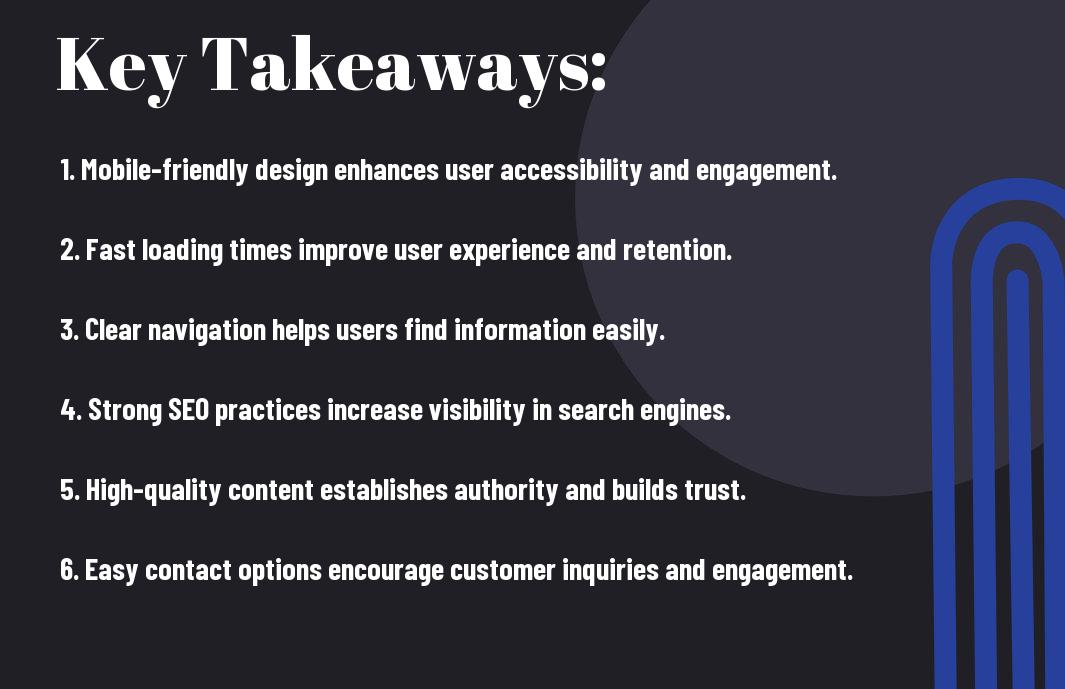With your small business striving for success, having a website with the right features is vital. Well-crafted sites enhance user experience, promote brand consistency, and drive online sales. Focusing on aspects such as mobile responsiveness, easy navigation, and effective SEO not only attracts visitors but also keeps them engaged. By prioritizing these elements, you can ensure that your website stands out in a competitive market and effectively supports your business goals.
Key Takeaways:
- User-friendly design that prioritizes easy navigation and a seamless user experience fosters higher engagement and conversion rates.
- Mobile responsiveness ensures that the website performs effectively on various devices, capturing a broader audience and improving accessibility.
- Robust SEO capabilities boost visibility in search engines, making it easier for potential customers to discover the business online.

Essential Design Elements
Before venturing into the world of website development, it’s important to understand the vital design elements that will help your small business thrive online. These elements not only enhance your site’s aesthetics but also improve functionality, ensuring that visitors can easily navigate and engage with your content. Balancing visual appeal with usability will set the foundation for a successful digital presence that resonates with your target audience.
User-Friendly Navigation
Elements that contribute to a user-friendly navigation experience include clear labels, organized menus, and logically structured content. This allows your visitors to find what they need quickly, reducing frustration and encouraging longer site visits. Well-thought-out navigation is instrumental in guiding customers toward your products or services, enhancing their overall experience.
Responsive Design
Above all, responsive design is vital for your website, ensuring it performs well across various devices, from desktops to smartphones. With more users accessing websites on mobile devices, having a design that adapts seamlessly is key. This not only improves user satisfaction but also positively impacts your search engine rankings.
Essential for your website’s success, responsive design guarantees that visitors receive a consistent experience regardless of the device they use. In a mobile-first world, failing to implement this feature can lead to increased bounce rates and lost sales opportunities. You want your website to look great and function optimally on all screen sizes. A responsive design adjusts layouts, images, and functionality to suit different device capabilities, thus enhancing user engagement and boosting conversion rates. Prioritize responsive design to keep your customers happy and your business growing.
Content Quality
While the aesthetic aspects of your website are important, the quality of your content significantly determines your small business’s success. Engaging, informative, and well-structured content not only captivates your audience but also establishes your authority in your niche. Quality content builds trust with potential customers and encourages them to take action, whether it’s making a purchase, signing up for a newsletter, or sharing your site with others.
Engaging and Relevant Content
For your website to thrive, it’s vital that the content you provide resonates with your target audience. Engaging and relevant content addresses the needs, wants, and pain points of your visitors, prompting them to spend more time on your site. This connection is vital, as it encourages interactions and repeat visits, ultimately leading to increased conversions.
Optimization for SEO
Content that isn’t optimized for search engines may limit your visibility, making it difficult for potential customers to find you. SEO optimization involves using targeted keywords, creating valuable content, and structuring it effectively to improve your rankings. A well-optimized website enhances your reach and boosts your credibility, attracting more organic traffic to your site.
Another key aspect of SEO optimization is ensuring your content is mobile-friendly and loads quickly. Google considers user experience as a ranking factor, which means that if your website performs poorly on mobile devices, it can significantly affect your visibility. Leveraging meta tags and structured data can also enhance your content’s visibility. By continually optimizing and updating your content, you can keep pace with ever-changing SEO guidelines, helping your small business maintain a competitive edge in the digital landscape.
Functionality and Features
All aspiring entrepreneurs need to pay attention to the functionality and features of their website. A well-designed site should smoothly combine user-friendly navigation, quick loading times, and responsive design to ensure an optimal experience on any device. Prioritizing these elements not only enhances customer satisfaction but also fosters trust, ultimately leading to increased conversions and business success.
E-commerce Capabilities
After establishing a strong online presence, your website’s e-commerce capabilities become vital for generating sales. Integrating secure payment processes, an easy-to-navigate product catalog, and a streamlined checkout experience can significantly improve customer retention and drive revenue growth.
Integration with Social Media
Between the myriad of marketing channels available today, your social media integration stands out as an effective method for engaging with your audience. By linking your website to your social media platforms, you can amplify your brand’s visibility and foster community interaction.
Social media integration allows you to connect directly with your audience, making it easier for them to share your content and products. By incorporating share buttons and linking your social profiles, you encourage word-of-mouth referrals, which can accelerate your customer base growth. Additionally, effective use of social media can help you stay connected with customers, receive valuable feedback, and keep them informed about your latest promotions. Always ensure to leverage the power of social media to maximize your online presence and engagement.
Trust and Credibility
Many small businesses struggle to establish a solid online reputation, but a website built on trust and credibility can transform your success. By incorporating elements that convey reliability, you can enhance your brand image and build lasting relationships with customers. This includes showcasing positive customer experiences, ensuring secure transactions, and maintaining an overall professional appearance that fosters confidence in your products and services.
Customer Testimonials
Against competitors, customer testimonials serve as powerful endorsements for your business. These reviews not only highlight the experiences of satisfied customers but also provide social proof that boosts your credibility. By displaying genuine feedback prominently on your site, potential customers can see real-life examples of your commitment to excellence, making them more likely to choose your offerings over others.
Secure Payment Options
Any online business must prioritize secure payment options to safeguard your customers’ sensitive information. By integrating trusted payment gateways, you create a safer shopping experience, increasing customer confidence in making purchases. The more secure and convenient your payment system, the more likely customers are to return for future transactions.
Testimonials play an integral role in affirming your payment methods. They reassure potential clients that their financial data is safe with you. Highlighting your use of industry-standard security protocols, such as SSL encryption and trusted payment processors, provides added assurance. Attract more customers by showcasing the peace of mind you offer with every transaction—this will make them feel secure and respected while shopping on your site.
Analytics and Performance Tracking
Once again, harnessing the power of analytics and performance tracking is important for small business success. By utilizing these tools, you can gain valuable insights into the effectiveness of your website, enabling you to make data-driven decisions that enhance user experience and boost conversions. Understanding these metrics allows you to identify areas for improvement, ensuring your website remains competitive in the digital landscape.
Understanding User Behavior
Behavior analytics involves analyzing how users interact with your website, providing you with a clearer picture of their preferences and habits. By examining metrics such as page views, click rates, and time spent on the site, you can better tailor your content and design to meet the needs of your audience, ultimately increasing engagement and satisfaction.
Measuring Website Success
Success in measuring your website’s performance hinges on key metrics that indicate growth and user satisfaction. By regularly tracking these indicators, such as conversion rates, bounce rates, and user engagement levels, you can assess how well your website is meeting its objectives and making a positive impact on your bottom line.
Website analytics empower you to make informed decisions about your online presence. By focusing on metrics like conversion rates, which reveal how many visitors are completing desired actions, and bounce rates, indicating the percentage of users leaving quickly, you can gauge engagement effectively. Monitoring metrics closely allows you to adjust your strategies promptly and capitalize on successful elements while actively working to mitigate underperforming sections of your site. With these insights, your website can transform into a powerful tool for driving your business success.
Maintenance and Support
Your website’s maintenance and support are necessary factors that contribute to its long-term success. By ensuring that your website remains updated and functional, you can provide a seamless experience for your customers, ultimately boosting your business’s credibility and online presence.
Regular Updates and Security
At the heart of a thriving website are regular updates and robust security measures. Keeping your website’s platform, plugins, and content current protects your site from vulnerabilities and enhances performance. Frequent updates also improve user experience and ensure your website aligns with the latest trends and technologies.
Customer Support Availability
For your business to operate smoothly, having reliable customer support is vital. Quick access to assistance can significantly affect your ability to address technical issues, ensuring your website remains operational and effective.
Even a slight downtime or minor technical glitch can lead to lost sales and customer frustration. Prioritizing customer support availability means you have the resources to resolve issues swiftly, whether through chat, email, or phone support. Ensure your web hosting or development provider offers dedicated support hours and effective communication channels to keep your website running at its best, allowing you to focus on other critical areas of your business.
To wrap up
The features that make a website the best fit for your small business success include a user-friendly design, mobile responsiveness, fast loading times, and effective SEO practices. These elements not only enhance user experience but also improve your online visibility and engagement. Additionally, integrating e-commerce capabilities and social media links can help you reach your target audience more effectively. By focusing on these components, you can create a compelling online presence that drives growth and attracts customers to your business.
Q: What website features are imperative for small businesses to attract customers?
A: To attract customers effectively, small businesses should consider incorporating several key features into their websites. An intuitive navigation structure is vital, allowing visitors to find information quickly and effortlessly. Additionally, mobile responsiveness is imperative since more users access websites via smartphones. Clear calls-to-action (CTAs) guide visitors toward taking desired actions, whether it’s signing up for a newsletter or making a purchase. Lastly, high-quality images and engaging content can capture the attention of potential clients and help convey the brand’s message clearly.
Q: How does search engine optimization (SEO) impact a small business website?
A: Search engine optimization (SEO) significantly impacts a small business website by improving its visibility on search engines. By optimizing content with relevant keywords, small businesses can attract organic traffic, making it easier for potential customers to discover their products and services. Additionally, a well-structured website with fast loading times and optimized for local searches can enhance user experience and increase the likelihood of conversions. Quality backlinks from reputable sites can further boost a website’s credibility, contributing to its overall success in driving traffic and sales.
Q: Why is e-commerce functionality beneficial for small business websites?
A: E-commerce functionality offers significant benefits for small business websites by providing a platform for direct sales and enhancing customer convenience. This feature allows businesses to reach a broader audience beyond their geographical location, increasing potential sales opportunities. Moreover, an integrated payment processing system simplifies transactions for customers, making it easier for them to make purchases. By utilizing analytics tools linked to e-commerce, small businesses can gain insights into customer behavior and preferences, enabling them to tailor their offerings and marketing strategies for better results.







